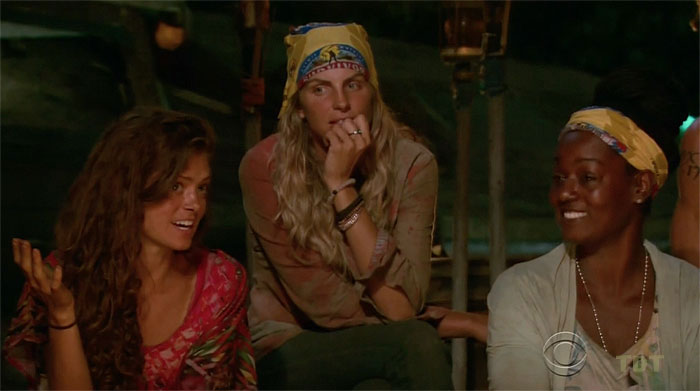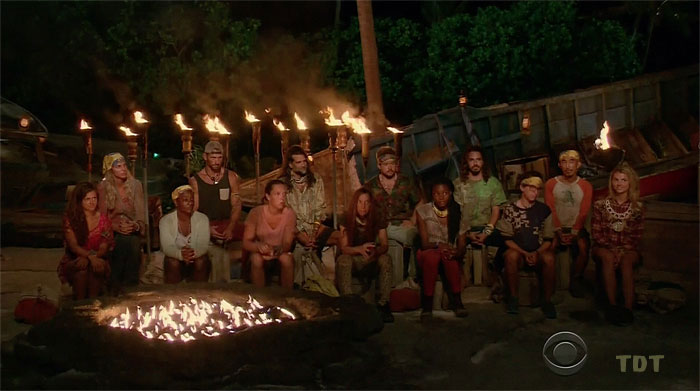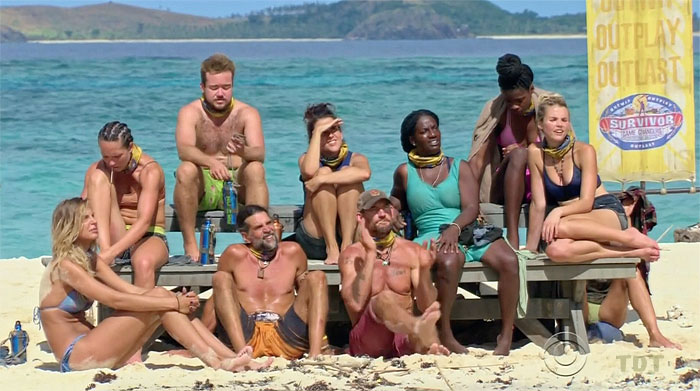

Someone like Ozzy, well he’s always going to be a target the first time he doesn’t win individual immunity. This season, he lasted two individual immunity challenges before the boot. It makes sense, right? Nobody wants to go against Ozzy – the physical competitor, non-strategic player and provider – at the end.
But what about Hali and her perfect hair (as mentioned by a commenter a couple weeks ago)? Why would any of the players not want to see her smiling face at the end? Heck, even Hali asked that question after her elimination.
Today we’re going to apply rational choice theory to the decision to vote off Hali. A relatively simply theory with numerous offshoots of sorts, the main key to rational choice theory is that, in the aggregate, people make decisions that they think are best for them.
This sounds pretty straightforward, right? That’s probably why the theory’s been around forever. First deliberated over in the middle of the 19th century, rational choice began life predominantly associated with economics and propagated by relatively famous economists such as William Stanley Jevons.
As is the case with most non-empirical and not predictive theories, rational choice can be endlessly debated. But, in essence, the theory makes a lot of sense. In economic terms, it posits that we as people make decisions about what we’re going to purchase based on a lot of information that we then prioritize and decide what’s best for us.
For example, let’s really simplify this: Think about the grocery store. When most of us go, we make decisions about brands. For some products, we might weigh the cost, the potential pros and cons and other factors and decide to buy a store brand. The store brand might not taste as good, but it’s cheaper, the difference in taste isn’t that stark and we don’t think people will think of us negatively if we buy said product.
However, there might be other products where we do the same calculus and decide the extra cost is worth it. For me, I’d never buy store brand coffee even if it’s way cheaper because I love coffee too much. Some of us might value fair-trade coffee because of the ethical implications and thus the rational choice is spending more.
The basis of theory is individual: We all make decisions about what’s best for us. Now, obviously, not everyone and not every decision is rational, which is why people can argue about the theory. But, again, this is about the aggregate. Most of us make the decision at the moment that’s best for us.

We saw that in two spots this week on Survivor. To most of us watching Hali go home, we probably wondered why would people eliminate an obvious goat who didn’t seem to strategize much. But think about if you’re the non-Cirie players.
The rational and easy choice might be to all come together as much as possible. If everyone in the game can effectively agree on eliminating one or two people, that could be the rational choice because it makes you safer and gets you further. In a post-merge situation, we often see this with the first vote or two: People are afraid to start actually playing the post-merge game and it’s easier to just vote off a goat.
For Cirie, eliminating Hali was an even more rational move. Faced with the choice of Hali or a potentially ally, of course you boot Hali and her hair.
Overall, when you think about it, the most rational decision in any Survivor elimination is the easiest one, especially post merge, which is why see it so often. Think about the first people eliminated after the merge recently: silent Michelle, annoying Nick, never-going-to-win Kass, Kelly Remington (who I have no recollection of), Julie was going to get the boot if she didn’t quit … the list goes on.
Hardly ever do we see a big player eliminated at the merge. It usually takes a vote or two simply because players want to find their post-merge bearings; that makes the easy vote the rational choice.
And that’s all the theory for this week. We’ll do this again next week. For now, though, here are my new thoughts on the remaining castaways:

- Debbie — Let’s just say that Debbie “acting” drunk looked about as convincing as me “acting” in general. Not good. One of the main problems with Debbie’s game, to these eyes at least, is, as mentioned, she’s delusional about her place in the game, but also her “strategic” decisions like acting drunk seem to have no real upside. Good for her for catalyzing the Ozzy vote, but we all know that post merge, Ozzy’s an easy target.
- Michaela — Honestly, I thought that moment on the beach between Michaela and Cirie was amazing. In a game for a load of money, we don’t see real moments like that very often. We’ve seen them now two episodes in a row, but while the Zeke moment got loads of attention – deservedly – this one won’t and it’s too bad. Good for Michaela for trusting someone and good for Cirie.
- Sierra — The editing, to me, took a big turn this week and, all of a sudden, Sierra is stepping up and making decisions. But even this week, we heard her say some things, but didn’t see much action. She wanted Michaela out, but Hali got the boot. Then the Ozzy vote off seemed to be orchestrated by Debbie. So?
- Tai — If I thought Tai could articulate his strategy and position well at final tribal, I would think he’d be the frontrunner right now. Unfortunately, I still don’t think he can. But is there any doubt we’ll be seeing Tai on television for a relatively long time to come?
- Aubry — Poor Aubry. She’s getting a Purple Kelly edit this season. I mean, maybe not quite since she speaks sometimes, but for a player who looked so impressive her first time out, that’s, um, not the case this time. She’s gone this week, right?
- Cirie — Finally, after having to go to tribal for the first time, classic Cirie came out to play. How can watch last week and not root for Cirie to win this thing? I don’t think she will, but, man, she just always knows what’s going on. That’s a gift.
- Andrea — Speaking of knowing what’s going on, Andrea put on a clinic this week. She was so clearly one step ahead of Zeke consistently. Now, of course, she’s in the minority and more than likely considered a big threat so she might go home as early as this week. But, and this is a big but, she played pretty damn well this week.
- Troyzan — I think my prediction last week might be coming true: Troyzan seems poised to play under the radar for the time being. The more I think about it, the more it seems like Troy might be sitting at final tribal.
- Brad — Oddly, we didn’t see much from Brad this week in terms of strategy. For weeks, anytime his tribe made a decision, editing clearly told the audience that Brad drove the decision … even if we don’t know if he really did. This week that wasn’t the case. Maybe that was strategic? I do think Brad is continuously making one subtle mistake: He keeps taking out male challenge beasts, which only puts the focus more on him … potentially.
- Sarah — I’m not really sure where Sarah’s head is at right now. We know she’s going to play like a criminal, but it seems like she jumped to the majority alliance and will definitely be on the bottom of that. Weird move.
- Zeke — Holy poop. We’ve seen basically two seasons of Zeke and before this week, one couldn’t really argue with his gameplay. This week? To me, his move was borderline moronic. Honestly, it was like the millennial stereotype in him had to come out, just a season too late. All of a sudden, Zeke couldn’t handle not being the strategic center, even for one vote. He can rationalize making Big Moves™ all he likes, but effective moves come when one thinks about the move’s effects. What was the end game here?
And with that, we’ll head in to next week. This season could start becoming a Pagonging, but let’s hope these returnees understand their position in the game and shake things up. Let’s talk in the comments.
 Pat Ferrucci started watching Survivor when Episode Two of Borneo first aired. He's seen every episode since. Besides recapping here, he'll be live-tweeting this season from the Mountain Time Zone. Why? Because nobody cares about the Mountain Time Zone except when they want to ski. Follow him @patferrucci for Survivor stuff and tweets about anything and everything that enters his feeble mind.
Pat Ferrucci started watching Survivor when Episode Two of Borneo first aired. He's seen every episode since. Besides recapping here, he'll be live-tweeting this season from the Mountain Time Zone. Why? Because nobody cares about the Mountain Time Zone except when they want to ski. Follow him @patferrucci for Survivor stuff and tweets about anything and everything that enters his feeble mind.
- S34 Well, in theory... index
- Cast: And the winner? I don't know?
- Eps.1-2: This cast is sure primed for fun
- Ep.3: Organize differently and boom, different culture
- Ep.4: Producers innovate, but it's unfortunately disruptive
- Ep.5: To compare or not to compare
- Ep.6: The drive to boot Sandra
- Ep.7: With the merge comes power rankings
- Eps.8-9: Booting Hali the rational choice
- Ep.10: Sarah revolts against dominance
- Ep.11: Don't rock the boat - we like it stable
- Ep.12: Do it and do it swiftly
- Ep.13: Where do we stand? A look at the Final 6
- Pre-Ep.14: Jury jeopardy